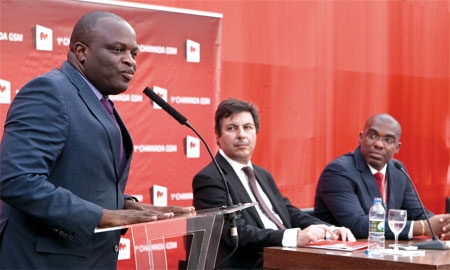Angola’s economy has grown rapidly in recent years, creating new jobs and fuelling demand for a variety of services, among them telecommunications. Movicel, the country’s second-biggest mobile telephone company, has grown rapidly since it was started in 2003 thanks to a combination of strong demand and a well planned expansion of its network throughout the provinces.
“Angola has experienced extraordinary development in recent years, not just in the telecommunications and the information and communications technology sectors, but in all sectors,” explains Carlos Brito, the company’s deputy director. “This is reflected in the economic progress of businesses and in people’s lives.”
Movicel, which after eight years has gained more than three million users, was a state-owned and controlled company until 2009. In July of that year the Angolan Government announced the sale of 80 per cent of the operator to a group of investors including Modus Comicare-Comunicacoes e Imagem Lda and Porturil Investments.
When Movicel started operations, Angola’s telecoms network was severely degraded as a result of decades of neglect during the civil conflict that ended in 2002. That presented Movicel and its competitors with the opportunity to start almost from scratch using the latest technology. Mobile telephony also provided a solution to the lack of fixed-line infrastructure.
“Movicel has been a pioneer in the country’s telecommunications and is a well structured company,” comments Mr Brito.
Movicel offers its clients a full range of telecommunications services, including voice, internet and other data. The company now provides services in all the country’s 18 provinces and is spreading its commercial presence across the nation, with its shop services complemented by a 24-hour customer help line.
“In time Movicel’s services will allow each Angolan citizen to have a mobile phone, a real personal communication,” says Mr Brita. “I also think that a big explosion similar to what is going on around the planet will be seen here in Angola in the data and video market. I believe that to some extent Angola is a country where wire telecommunications will not have to fill in gaps like it did in other countries; the inexistence of the means of landline communication in many areas allow mobile telecommunication to be used at its full potential being the only communication tool. To be able to achieve this we need higher capacity, with speeds comparable or better than many European countries. This will soon be available here in Angola.”
Covering an area of 481,353 square miles, Angola is a huge country and more than five times the size of the UK. Internet access is an especially important service because the landline network is only now being extended to cover the whole country.
“Movicel’s data communication service offers data rates of about one megabit per second, which is an interesting rate for data transmission, and we believe that we are currently the company that has the best service offer in this area,” says Mr Brita.
Movicel is working on several fronts to improve its internet services, including investing more than $100 million (£62 million) on upgrading its network to GSM technology, which is already in use in Luanda and in Benguela province.
“Essentially we are creating conditions so that we can greatly increase the number of customers using our data services for internet access,” says Mr Brito. “This is done through lowering the cost of modem cards, phones and data communication tariff rates. It is also done with an increase in capacity and easier network access.”
With a penetration rate of around 57 per cent at the end of 2010, the mobile market in Angola still has ample growth potential with regards to attracting new customers and offering a greater range of products and services.
Movicel’s goal is to expand and improve telephone and internet services throughout the entire country to help make life better and easier for businesses, educators and the economy, as well as the country in general. The company does this through constant investment in new equipment and through its strong corporate responsibility programmes, which focus on helping children and the handicapped.
“The company has a clear focus on Angolan society and therefore pays a great deal of attention to social development, in which it wants to participate,” says Mr Brito. “It is particularly active in promoting initiatives that may help people with handicaps and it also looks at how it can support children.
“Movicel supports a number of entities that deal with underprivileged children. These are the two focuses that the company has had and wants to maintain without affecting other more specific interventions, such as Movicel’s sponsorship of young people in sport.”
According to Mr Brito, Angola is a country that is looking for investors that want to contribute to the development of the country and it offers benefits to those that bet on a country that is undergoing extraordinary growth. He says, “Telecoms in Angola will improve more and more. By offering innovation and quality in mobile services, Movicel expects to be up to the challenges that any new entrants may provide in the future.”

0 COMMENTS